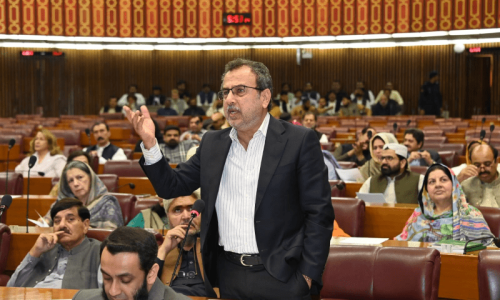KARACHI: The Sindh police have suggested various amendments to the colonial-era Criminal Procedure Code (CrPC) for enactment of an alternative dispute resolution (ADR) mechanism and civil cases, bail and pecuniary punishments for suspects held for possessing a small quantity of contrabands, it emerged on Sunday.
According to official sources and documents reviewed by Dawn, it is also suggested that a SP-ranked officer should be made responsible for allowing any arrest or not.
They said the proposed amendments were aimed at lessening the burden on police, courts, prosecution and prisons.
“The Sindh police have proposed amendments to lessen burden on the criminal justice system,” said a senior police officer familiar with the development.
‘Unbridled powers’
He was of the view that there was a huge burden of ‘frivolous’ cases on the criminal justice system partly because of the legacy of colonial powers, which unfortunately had not been rationalised or modernised.
The officer regretted that sometimes the term ‘police state’ was used mainly because of the existence of Section 54 of the CrPC, which granted ‘unbridled’ powers to police, or an SHO, that were being abused widely due to host of reasons as these powers were not rationalised and there was no regulatory mechanism.
A four-member police team has sent its recommendations to Sindh govt
The officer recalled that when courts referred cases to the police in 2019 under Section 22-A of the CrPC it was transpired that around 90 per cent of the FIRs were frivolous. The amendment would reduce the burden of such frivolous cases on the criminal justice system, he added.
Official sources said that in pursuance of a meeting between Chief Minister’s Law Adviser Murtaza Wahab and Inspector General of Police Mushtaq Ahmed Mahar, a committee was constituted by the provincial police chief on Jan 4. Headed by DIG-Investigation Farhat Junejo, it comprised DIG-Mirpurkhas Zulfiqar Larik, DIG-Training Naeem Shaikh and DIG-Finance Zulfiqar Mahar being the other members.
According to its Terms of Reference (ToR), the body is asked to propose a list of different sections of the Pakistan Penal Code 1860, where “powers of arrest are widely abused by the police and to recommend as to which rank should be responsible for allowing arrest in each of these criminal offences”.
The committee was also tasked to propose amendments to the Police Rules incorporating a “calendar of evidence” for each offence to be examined by the officer responsible before allowing the arrest with a mind on prosecution of the case.
Accused’s right to legal aid proposed The committee was also asked to propose as to whether there should be some ADR mechanism for decriminalising certain offences.
It was also asked to lay down a comprehensive standard operating procedure for grant of bails and release of suspects by police in all bailable offences and right of the accused to have recourse to legal aid.
The sources said the Sindh police prepared the recommendations recently and submitted the same to the secretaries of the home and law departments for implementation.
The committee recommended enactment of the ‘Sindh Alternative Dispute Resolutions Law’ on the lines of the laws in Punjab and Khyber Pakhtunkhwa to reduce the burden on police, courts and prisons.
The Sindh police believed that the introduction of an ADR mechanism in the province was likely to help citizens get their petty issues resolved amicably through “an alternative process of justice involving members of civil society”.
“This will also lead to decriminalisation of cases of civil nature and petty disputes, which have all the potential to turn into cognizable offences if not attended at initial stages,” according to one of the documents reviewed by Dawn.
The committee has also recommended amendments to the Schedule-II of the CrPC to classify such offences where the recoveries of contraband substances like gutka, mainpuri etc was insignificantly trivial as bailable by police.
It further recommended pecuniary punishments through trial for such offenders by the courts concerned in the same way the anti-beggary laws were implemented.
Finally, the committee recommended amendment to the Police Rules 26.1 and 26.2 of 1934 pertaining to general powers of a police officer to arrest or defer arrest, to include a proviso holding an SP-ranked officer legally responsible for any arrest or its deferment.
Sources said that the recommendations of the committee to the extent of their operational ambit had already been implemented by the IGP-Sindh by issuing “SOPs on arrest in cognizable cases and grant of bail and release” to the field/commanding officers.
Published in Dawn, February 22nd, 2021
















































Dear visitor, the comments section is undergoing an overhaul and will return soon.